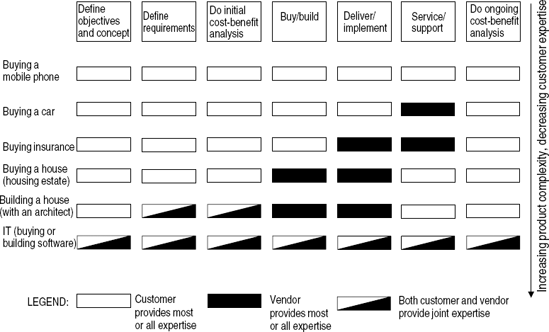3.3. Who provides process expertise – client or vendor?
Depending on the complexity of a product or service, a certain level of specialist expertise might be required in order to successfully complete the underlying processes. Such expertise can take one of three forms (see Figure 3.1):
Figure 3.1. Specialist expertise required as a function of product complexity

Customer expertise: It is mainly provided by the customer. If I buy a car, for example, I'm usually capable of deciding what to buy without any specialist assistance outside of car magazines or web sites.
Vendor expertise: It is mainly provided by the vendor. For example, if I'm an ordinary computer user with little knowledge of PCs, I would probably rely on the vendor to suggest a configuration for me based on my usage requirements.
Joint expertise: It is jointly provided by each. In this case neither the vendor nor the customer has the combined expertise necessary to successfully complete the process. In this scenario, both the customer and the vendor provide inter-related expertise, the sum of which will define the final process deliverable. For example, if I want to have a house custom-built, then my own requirements and knowledge of the neighbourhood, combined with the architect's expertise (and a lot of to and fro between the two) will result in a final design that might not necessarily have been evident at the beginning. ...
Get IT Success!: Towards a New Model for Information Technology now with the O’Reilly learning platform.
O’Reilly members experience books, live events, courses curated by job role, and more from O’Reilly and nearly 200 top publishers.

